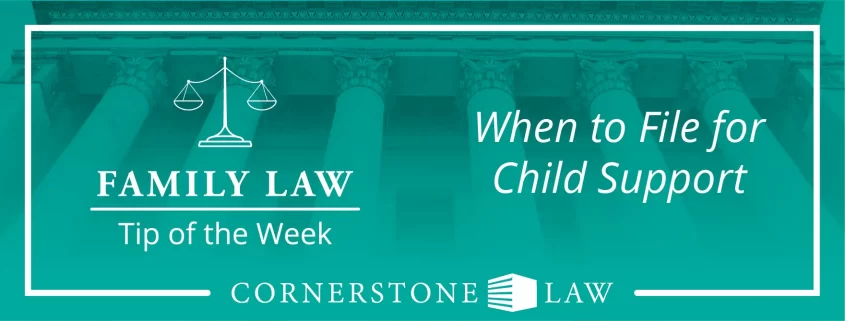Family Law Tip of the Week: When to File for Child Support
Welcome to Family Law Tip of the Week, a regular series on our blog where we offer tips on how to go through divorce and custody disputes in an amicable way. Divorce should always be a last case resort but if you are going through it, we want to provide some tips on how to survive it.
When should I file for Child Support?
Today’s tip: when should you file for child support? Filing for child support begins the process of asking a court to set the amount that a child’s parent has to pay to support the custodial parent’s work in raising the child. The state has provided guidelines to help determine the set amount. The general range of appropriate child support can be figured out ahead of time. Parents who are splitting up begin discussions on how to do child support and the question arises: Should I file for child support anyway?
It’s always best to work things out away from the Court, but if negotiations are lagging, it is important to go ahead and file in court. You can always reach an agreement with the other parent later and inform the court that a hearing is no longer needed. But because hearings can take 45 to 60 days to have scheduled, it is important to get the clock started quickly.
Another reason that it is important to file for child support is that the date of your filing is when the obligation to pay arises. In other words, if you’re negotiating throughout February of a given year and you file on March 1st because you’re not reaching an agreement and the other party refuses to pay, the court will only award child support back to the filing date of March 1st, not for the month of February, for which you were negotiating. For this reason, there is almost no reason to not go ahead with filing for a child support claim, unless you are sure that you are going to work it out with the other person very quickly and you trust them to make payments.
Finally, once you have worked it out with the other side, it’s important to reduce it all to a written contract that can be provided to the Court later, for proof of nonpayment. Relying on text messages or oral agreements is a recipe for confusion and for a judge to say they won’t enforce a previous agreement or create a new one going forward.
All of these are just an overview of some of the things to think about with child support. If you have a question about your specific situation, call Cornerstone Law Firm to talk to one of our Family Law attorneys.



